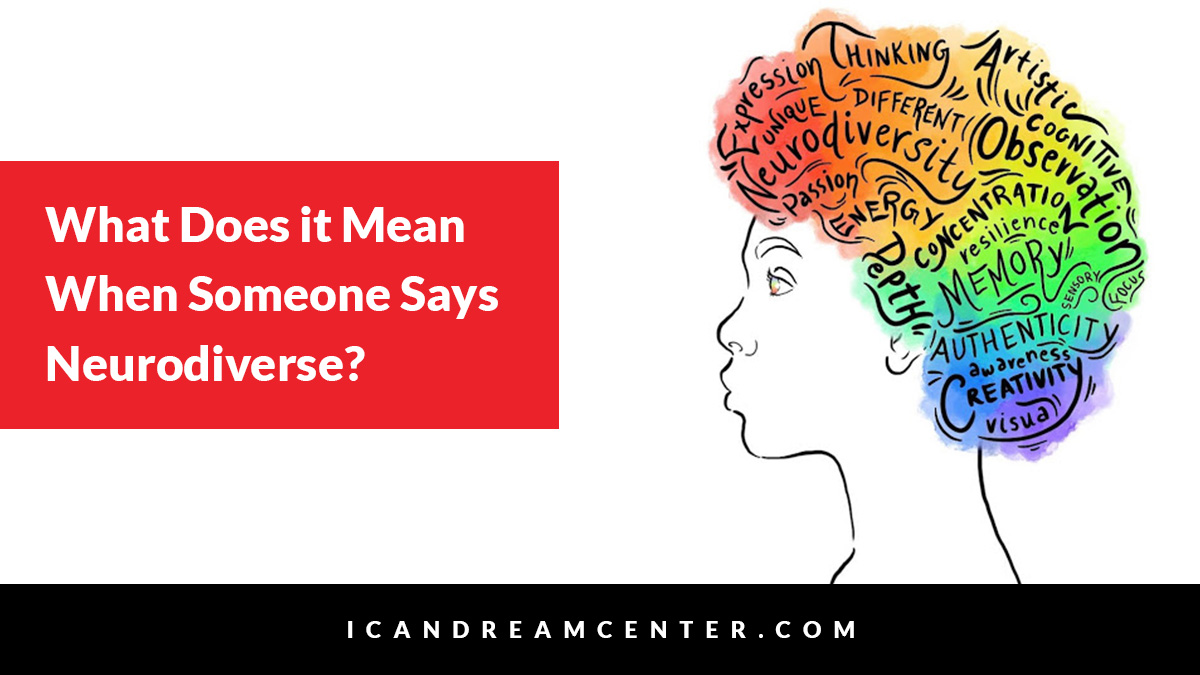
What Does it Mean When Someone Says Neurodiverse?
Neurodivergence is the term for when someone’s brain processes, learns, and/or behaves differently from what is considered “typical.”
It is not a disability but a difference in how the brain works. With this shift, practitioners are no longer treating neurodivergence as an illness. Instead, we view neurodiversity through a lens of an individual needing different methods of learning and processing information.
Understanding Neurodiversity
Neurodiversity is the idea that it’s normal and acceptable for people to have brains that function differently from one another. Rather than thinking there is something wrong or problematic when some people don’t operate similarly to others, neurodiversity embraces all differences. The concept of neurodiversity recognizes that both brain function and behavioral traits are simply indicators of how diverse the human population is.
Neurodiversity can be broken down into two categories of people: those who are neurotypical and those who are neurodivergent.
Neurotypical
Neurotypical is a descriptor that refers to someone who has the brain functions, behaviors, and processing considered standard or typical.
Neurotypical people may have no idea they are because the subject has likely never come up for them before! These people usually hit all of their developmental and behavioral milestones at the same times and ages that are considered standard for most people.
Once grown, they generally move through life without having to wonder if their brains function in the same way as others do.
Neurodivergent
Neurodivergence is the term for people whose brains function differently in one or more ways than is considered standard or typical.
There are many ways that neurodivergence manifests, ranging from very mild ways that most people would never notice to more obvious ways that lead to a person behaving differently than is standard in our society.
Types of Neurodivergence
Because the idea of neurodivergence has grown to encompass a range of consistent ways that some brains work differently than others, it shouldn’t be surprising to learn that there are many ways neurodivergence manifests.
You may not have heard of all the different types, but chances are you are familiar with some. These are the most common examples.
Autism
Autism is known as a “spectrum disorder” because cases range from mild to severe. It previously had many subtypes, such as Asperger’s and Pervasive Developmental Disorder (PDD), but now they are all classified as an Autism Spectrum Disorder. ASD can affect someone’s behavior and emotions.
Autism is a broad set of conditions that may include challenges with socializing and social skills, repetitive behaviors, and speech difficulties that can lead people to communicate only nonverbally.
Autistic people often display the following traits: great attention to detail, strong focus skills, creativity, and visual learning abilities.
ADHD
Attention Hyperactivity Disorder (ADHD) is an executive function dysregulation disorder, which means individuals may have difficulties managing their thoughts, attention, behaviors, and emotions.
People with ADHD may have difficulty with organization, be restless, seem disinterested or zoned out, and show inappropriate behavior when experiencing strong emotions.
Thanks to their out-of-the-box thinking, people with ADHD are often great problem solvers, may be energetic and “fun,” and are often sensitive to others.
Dyslexia
This form of neurodivergence involves speaking, reading, and writing. Dyslexia is typically associated with misreading, writing, or speaking words or letters out of order, but it encompasses more than that. For example, it may involve confusion with certain letters, difficulty organizing words into sentences, trouble acquiring a vocabulary or pronouncing words, and/or challenges following directions.
People with dyslexia are often big picture thinkers who excel at visual processing. In addition, they tend to have strong spatial awareness and may be very creative.
Other Types
Other types of neurodivergence include Tourette’s, dyspraxia, synesthesia, dyscalculia, Down syndrome, epilepsy, and chronic mental health illnesses such as bipolar disorder, obsessive-compulsive disorder, borderline personality disorder, anxiety, and depression.
How to Know If You’re Neurodivergent
If you have been diagnosed with any of the above conditions, you would be considered neurodivergent. On the other hand, if you have never been formally diagnosed but resonate strongly with the descriptors for one or more types of neurodivergence, you might benefit from seeking a professional to find out for sure.
While neurodivergence is common, many people do not realize they are neurodivergent until they reach adulthood. This can create challenges as people find ways to adapt to the differences in how they think and process information, but it can also be helpful. For many adults, finding out they have ADHD, autism, or another form of neurodivergence often helps explain things they didn’t understand about themselves previously.
In all areas of life, having a formal diagnosis can bring you a deeper sense of understanding about why you function the way you do and how to best work with that.
If you have never been diagnosed with any of the above terms and never felt that you had any symptoms, then chances are you are neurotypical.
Can You Become Neurodivergent?
Many forms of neurodivergence are an innate part of how the brain develops and functions. While these differences may go unrecognized or undiagnosed in childhood, that doesn’t mean they were not there and suddenly appeared in adulthood.
Acquired neurological conditions, such as traumatic brain injuries, strokes,
What Is It Like to Be Neurodivergent?
There is no one answer to what it’s like to be neurodivergent. There isn’t even an answer to what it’s like to have any kind of specific neurodivergent diagnosis!
People are individual and unique; in the same way that it doesn’t feel the same for all people to have bodies, it doesn’t feel the same for all people with different neurodivergent diagnoses.
Life is experienced differently by all humans, whether their brains function very similarly to the majority of people, or very different.
Learn More About Neurodivergence
If you’re interested in learning more, please reach out to us. We provide professional development opportunities for school districts and other organizations.
